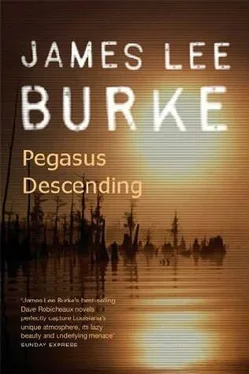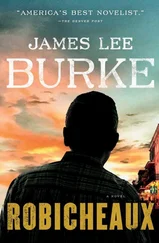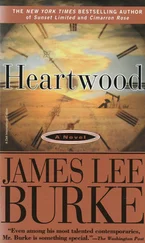“How are you, Mr. Robicheaux?” she said.
“I’m sorry to bother you at a time like this. I can come back later if you like,” I said.
“Call me Valerie. You’re only carrying out the obligations of your office,” she said. “Do me a favor, though. Would you open the jalousies and let the mist in? I love the cool smell of the morning. When I was a child in New Orleans, I loved the coolness of the mist blowing in from Lake Pontchartrain. My father often took me to the amusement park by the water’s edge. Do you remember the amusement park on the lake?”
Her detachment from Bello ’s murder might have been written off as the effects of shock or perhaps even a thespian attempt to deal with tragedy in a dignified fashion. But I believed that in the mind of Valerie Lujan all the grief the world could expect of her had already been extracted by the death of her son, and she felt no shame in refusing to mourn a husband whose sexual appetites had taken him far from his wife’s bed.
“Did Bello give you any indication that Whitey Bruxal might have wanted him dead?” I said.
“Why would Mr. Bruxal want to harm Bello? Tony was friends with Slim, but Bello didn’t associate with Mr. Bruxal.”
“They were business partners.”
“They may have invested in the same enterprises, but they were hardly partners.” She eased herself down on the couch and sighed pleasantly. “My, it feels good to stand up. I’m volunteering at the university to teach a noncredit drama course. I haven’t done anything so uplifting in years.”
“I see.”
“You don’t think well of me, do you?”
I dropped my eyes. “I think you’ve carried a heavy load much of your life, ma’am.”
“I spoke by telephone this morning with my spiritual adviser, Reverend Alridge. His insight has helped me enormously. My husband was a racist, pure and simple. He sexually exploited Negro women and consequently inflamed their men. That may have contributed to Monarch Little’s murdering my son. Now it may have cost Bello his life as well.”
“You’re saying Monarch Little killed your husband?”
“If I understand correctly, Bello was killed with a maddox or a pick of some kind. You’re a realist and I don’t think given to political correctness, Mr. Robicheaux. Who else except a depraved Negro criminal would kill like that?”
I looked away from the glare in her eyes. In my mind’s eye I saw Monarch Little in his baggy pants and weight lifter’s shirt, with an oversize ball cap askew on his head. I also saw the two-hundred-dollar tennis shoes, with gas cushions in the soles, that he wore as part of his cartoon-character persona.
Wrong fashion choice, Monarch.
“Come visit me again, Mr. Robicheaux. Somehow something good will come out of all of this. I have faith for the first time in years. I hope you find it, too,” Mrs. Lujan said.
Her unevenly recessed eyes were liquid with the warmth of her own sentiment. I had the feeling Mrs. Lujan had just taken up serious residence in the kingdom of the self-deluded and would be a long time in freeing herself from it.
I DROVE TO the rural slum on the bayou, just outside the city limits, where Monarch lived. A junker car was parked in the drive, but no one answered the door. His neighbor, an elderly black woman picking up trash from a drainage ditch, told me Monarch was in town.
“He’s working?” I said.
“His mother died. I ain’t sure what he’s doin’.”
“Died? I thought his mother was coming home from the hospital.”
“She had a heart attack two days ago. Monarch gone off wit’ his friends. They t’rowed all their beer cans in my li’l yard. Tell Monarch he ought to be ashamed of hisself, his mother not yet in the ground.”
“Ashamed why?”
She picked up a crushed beer can, threw it hard in her gunnysack, and didn’t reply.
I drove back to New Iberia and crossed the Teche on the drawbridge at Burke Street. The water was high on the green slope of the banks, the surface dimpled with rain, and black people were fishing with cane poles and cut bait from under the bridge. Then I turned down Railroad Avenue into New Iberia’s old brothel district, the one place in our town’s history where indeed the past had never become the past.
JUST AS THE STREET-CORNER crack whores had supplanted their five-dollar antecedents in the cribs that had lined Railroad Avenue, Monarch Little, in his way, had kept the traditions of the red-light district alive by returning to the neighborhood as victim if not as purveyor.
It was still raining lightly when I pulled my truck under the overhang of the oak tree where Monarch used to deal dope. The weight set he had used to add inches to his arms and shoulders still sat on the hard-packed dirt apron under the tree, rusting, beaded with moisture. A kid who was nicknamed “Rag Nose” because he had burned out the inside of his head sniffing airplane glue was sitting on the backrest of a bench a few feet away, looking innocuously up and down the street, as though I were not there.
He was well over six feet tall, with a head that looked like an elongated coconut. His feet were sockless and stuffed in unlaced high-top tennis shoes.
“Seen Monarch around?” I said.
“No, suh, ain’t seen him.” He tapped his feet up and down on the bench, flexing a toothpick in his mouth, furrowing and unfurrowing his brow as though hundreds of thoughts were flying through his mind.
“Still going to your meetings?” I said.
“Yes, suh. All the time. I’m taking off for one in a few minutes.” He looked at his wrist, then realized he wasn’t wearing a watch.
“I need to find Monarch,” I said.
He scratched his head. “Yeah, Monarch be out at his house maybe, or working, or driving round wit’ his friends.”
“Your real name is Walter, isn’t it?”
“Sometimes it is,” he replied, and picked at a scab on the back of one hand.
“I don’t work Vice, Walter. I’m not here to hurt Monarch. I’d like to see him stay out of trouble. But I can’t do that if his friends lie to me.”
The soles of Walter’s tennis shoes tapped on the bench again. He looked up into the tree, then at the mist blowing across the roofs of the houses, then at the wet glaze on the little white grocery store that tried to survive in a neighborhood long ago given over to dealers and whores and kids like Walter who had permanently fried their grits. I saw Walter teeter on the edges of honesty and trust, then the moment faded and he looked down at his shoes. “Ain’t seen him,” he said.
But events were not on Walter’s side. A black woman whose street name was Sno’ball pulled a child’s wagon from around the far side of the grocery store. The wagon was loaded with twenty-pound sacks of crushed ice.
“See you, Mr. Dave,” Walter said, and was gone like a shot.
Sno’ball, so named because she was fat, coal-black, and wore white dresses, towed the wagon down the street toward a tan stucco house whose yard was strewn with garbage. The front porch of the house was wide and breezy and offered shade during the hottest hours of the day, but it was also cluttered with broken wood furniture, a rain-soaked couch, and a mattress that had been blackened by fire.
I caught up with Sno’ball. “Early for a beer party,” I said.
“Refrigerator is burnt out. Bunch of steaks in there gonna spoil,” she said.
“Going to invite me to your cookout?” I said.
She smiled and continued pulling the wagon up the sidewalk, tugging it across the slabs that were pitched and broken by oak roots that grew from a tree in the yard of the stucco house. Sno’ball’s smile and good disposition did not go with the type of work she did. She was a tar mule for Herman Stanga, a black piece of shit who should have been hosed off the bowl long ago. Why she worked for Herman was anyone’s guess.
Читать дальше












